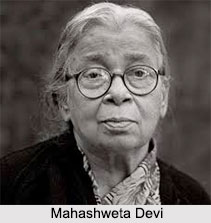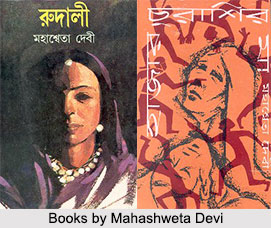 Mahasweta Devi have had dominated in Indian regional literature in recent decades for her works related to the study and her incessant battle against the perpetrators of exploitation the adivasis, tribal communities of West Bengal, (especially in Jangalmahal) women and Dalits.
Mahasweta Devi have had dominated in Indian regional literature in recent decades for her works related to the study and her incessant battle against the perpetrators of exploitation the adivasis, tribal communities of West Bengal, (especially in Jangalmahal) women and Dalits.
As an activist she has set herself as an exemplary epitome in the due course of her struggle for the rights of the cross sectioned tribal, the marginalised populace in Bihar, Madhya Pradesh and Chhattisgarh.
In her elaborate Bengali fiction, Mahasweta Devi often depicts the brutal oppression of tribal peoples and the untouchables by potent, authoritarian high-caste landlords, lenders, and venal government officials.
Early Life of Mahasweta Devi
Mahasweta Devi was born in Dhaka in 1926, of parents with rare literary talents. Her father Manish Ghatak was a poet and mother Dharitri Devi was a writer and devoted social worker. There is hardly any dichotomy regarding the fact that her genes are hugely responsible for her genius.
Education of Mahasweta Devi
Mahasweta Devi had her early education in a school of Dhaka. After the partition of Bengal, she came to West Bengal and was admitted to Vishvabharati University in Santiniketan, from where she passed her B.A. (Hons.) in English and passed M.A. in English from Calcutta University in 1963 as a private student. Her interest in writing sprouted from a very early age as from that age only she contributed short stories to various literary magazines.
Early Career of Mahasweta Devi
Mahasweta Devi took up teaching and journalism as her profession at the first part of her life, but because of her indomitable spirit and political views could never settle in any job. Her first novel Nati was published in 1957. Profound rays of blissful humanism imbued with a constant love for the needy, suffering distressed humanity lies at the core of Mahasweta Devi `s philosophy and world view.
Writings of Mahasweta Devi
The writings of Mahasweta Devi acts as the canvas, as she paints the struggled life of particularly of the Adivasi people like the Santhal Tribe, Lodhas, Shabars and Mundas, the semi feudal and semi colonial society structure, the simple joys, sorrows of their life, their exploitation and sufferings and conditions of abject poverty in which they sustain. Most of her short stories and novels portray the life of the downtrodden, the neglected people of the country, devastated by man`s greed, narrowness and selfishness. Some of her writings will undoubtedly overcome the barriers of time and live in people`s minds, for years to come. Bioscoper Baksho, Aranyer Adhikar, Hajar Churashir Ma, Chatti Munda O Tar Tir are considered to be her masterpieces. She has also contributed to Economic and Political Weekly, Business Standard and other magazines.
Works of Mahasweta Devi
 Mahasweta Devi`s story Draupadi, for instance, named after Mahabharata`s heroine Draupadi, Devi`s lower-caste protagonist is pseudo named such by her upper-caste mistress. She can`t even pronounce it-the Dalit tongues and dialects simply don`t form those syllables, and she is called "Dopdi" instead, the regional police are after her since she is suspected of being a guerrilla Maoist. Hajar Churashir Ma (Mother of the prisoner1084) portrays the character of Brati, an angry, aggressive revolutionary character, a product of the middle class family who had had to witness a certain socio- political scenario, and realised such factors of life and time that played crucial roles to change him gradually.
Mahasweta Devi`s story Draupadi, for instance, named after Mahabharata`s heroine Draupadi, Devi`s lower-caste protagonist is pseudo named such by her upper-caste mistress. She can`t even pronounce it-the Dalit tongues and dialects simply don`t form those syllables, and she is called "Dopdi" instead, the regional police are after her since she is suspected of being a guerrilla Maoist. Hajar Churashir Ma (Mother of the prisoner1084) portrays the character of Brati, an angry, aggressive revolutionary character, a product of the middle class family who had had to witness a certain socio- political scenario, and realised such factors of life and time that played crucial roles to change him gradually.
Some of the notable works of her are:
Hajar Churashir Ma (No. 1084`s Mother, 1975)
Aranyer Adhikar (The Right to the Forest, 1977)
Agnigarbha (Womb of Fire, 1978)
Choti Munda evam Tar Tir (Choti Munda and His Arrow, 1980)
Imaginary Maps, 1995 (translated by Gayatri Spivak) London & New York.
Routledge
Dhowli (Short Story)
Breast Giver (1998)
Dust on the Road
Our Non-Veg Cow (1998)
Bashai Tudu (1993)
Titu Mir
Master Saab ( The School Teacher)
Rudali
The Book of the Hunter (2002)
In Other Worlds: Essays in Cultural Politics (1987)
Awards received by Mahasweta Devi
Literary awards include the prestigious Gyanpith award for literature in 1996. In recognition of her social activism through the medium of literature, she has been honoured with Padma Vibhushan Awards, Magsaysay and Padmasree awards for her activist work amongst dispossessed tribal communities. Besides this, she is the recipient of India`s highest literary award the covetous, Jnanpith Award (1996) and Yashwant Rao Chavan National Award for 2010 for her contribution to national integration, democratic values and the socio-economic development of India.
Personal Life of Mahasweta Devi
Mahasweta Devi married renowned dramatist Bijan Bhattacharya and founding father of IPTA. She gave birth to the notable writer Nabarun Bhattacharya, currently a writer whose works are praiseworthy because of their intellectual fervour and philosophical lineages.
Related Articles
Regional Indian Literature
Bengali Literature
Kallol Era in Bengali Literature
Sanskrit Influence on Bengali Literature
Charyapada, Bengali Literature
Bengali Literature in Sixteenth Century
Chandi Fable, Bengali Literature



















